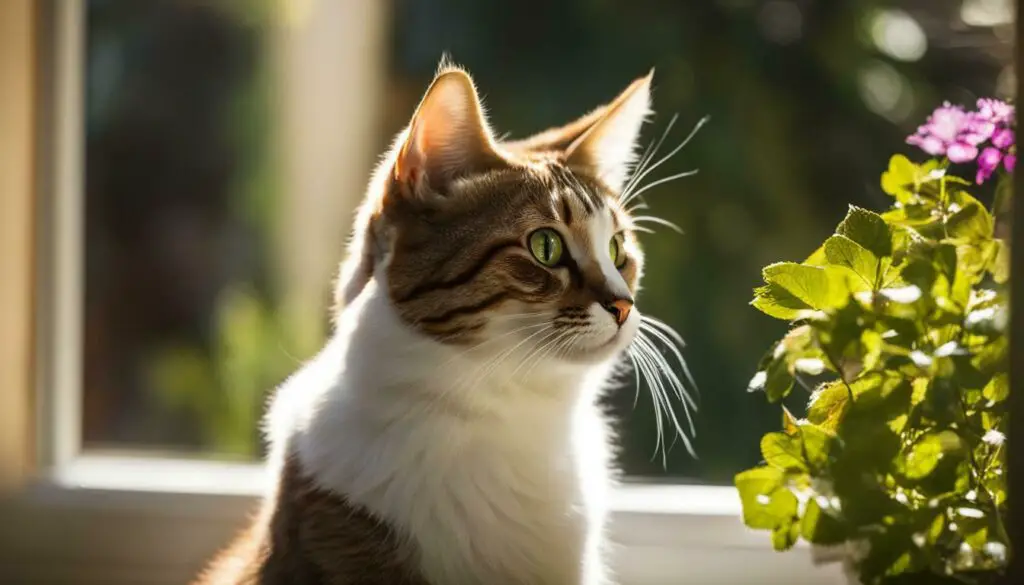Welcome to my guide on the cheapest hypoallergenic cats, perfect for those who suffer from allergies but still want to experience the happiness of feline companionship. While it’s a common misconception that hypoallergenic cats don’t produce allergens, certain breeds have lower levels of the Fel d 1 protein, making them more suitable for allergy sufferers. In this article, we will explore some of the most affordable hypoallergenic cat breeds that can bring joy to your life without triggering allergies.
Key Takeaways:
- There are no truly hypoallergenic cats, but certain breeds produce fewer allergens.
- The primary allergen in cat saliva, the Fel d 1 protein, is responsible for most allergic reactions.
- Cats that shed less tend to produce fewer allergens.
- Some affordable hypoallergenic cat breeds include the Sphynx, Siberian, Cornish Rex, Devon Rex, Russian Blue, and Balinese.
- Minimizing allergens in the home can help allergy sufferers coexist with their feline friends.
Understanding Feline Allergens and Hypoallergenic Cat Breeds
Before we dive into the cheapest hypoallergenic cat breeds, it’s essential to understand feline allergens and the characteristics that make certain breeds more suitable for allergy sufferers. While the concept of hypoallergenic cats is a misconception, there are breeds that produce lower levels of the primary allergen, Fel d 1 protein, found in a cat’s saliva. These breeds shed less, resulting in fewer allergens in the environment.
It is important to note that cat allergies are caused by the proteins in a cat’s skin, saliva, urine, sweat, and fur, rather than the fur itself. When these allergens come into contact with an allergic individual, they can trigger allergic reactions ranging from mild symptoms like sneezing and itchy eyes to more severe respiratory distress.
Several cat breeds are known for producing fewer allergens, making them more suitable for allergy sufferers. The Sphynx, for example, with its hairless appearance, is often considered hypoallergenic because it produces less dander. Other breeds like the Siberian, Cornish Rex, Devon Rex, Russian Blue, and Balinese also have lower levels of the Fel d 1 protein and are often recommended for those with allergies.
| Breed | Allergen Level | Characteristics |
|---|---|---|
| Sphynx | Low | Hairless breed, minimal shedding |
| Siberian | Low | Thick, hypoallergenic coat |
| Cornish Rex | Low | Soft, curly fur, minimal shedding |
| Devon Rex | Low | Soft, curly fur, minimal shedding |
| Russian Blue | Low | Short, dense coat, minimal shedding |
| Balinese | Low | Silky, semi-long fur, minimal shedding |
While these breeds may be more suitable for allergy sufferers, it’s important to remember that individual reactions can vary. Some individuals may still experience allergies, even with hypoallergenic breeds. It’s always recommended to spend time with a cat of the chosen breed before committing to ownership, to see how your body reacts to their specific allergens.
In our next section, we will provide tips for allergy sufferers on how to ensure a healthy and allergy-free environment for both themselves and their feline companions.
Tips for Allergy Sufferers with Cats
If you’re an allergy sufferer with a cat, don’t worry! Here are some helpful tips to ensure your well-being and the health of your feline friend.
- Create an “allergy-free” zone: Designate certain areas of your home as off-limits for your cat. This can include your bedroom or other rooms where you spend a lot of time. Keeping these areas cat-free can help minimize your exposure to allergens.
- Invest in proper grooming: Regular grooming can significantly reduce the amount of allergens in your home. Brush your cat frequently to remove loose fur and dander, and consider using hypoallergenic wipes to clean their fur. If grooming triggers your allergies, ask a non-allergic family member or a professional groomer for assistance.
- Keep your home clean: Regularly vacuum and dust your home to remove allergens that may have settled on furniture and surfaces. Consider using a vacuum with a HEPA filter and selecting cleaning products specifically designed to neutralize allergens.
“For allergy sufferers, it’s important to maintain a clean and allergen-free environment for both yourself and your cat. By following these tips, you can minimize symptoms and enjoy a happy and healthy life with your feline companion.
Understanding and Managing Cat Allergies
Allergies to cats are caused by proteins found in their skin, saliva, urine, sweat, and fur. While no cat is truly hypoallergenic, certain breeds are known to produce less of the Fel d 1 protein, the primary allergen found in a cat’s saliva. These breeds, including the Sphynx, Siberian, Cornish Rex, Devon Rex, Russian Blue, and Balinese, are often better suited for individuals with allergies. These cats shed less, which means they produce fewer allergens.
It’s important to note that managing cat allergies is a continuous process. Besides minimizing allergens in your home, you can also consult with an allergist for personalized advice and treatment options. Remember, with proper care and attention, you can create a harmonious environment where you and your cat can live happily together.
| Breed | Hypoallergenic Qualities |
|---|---|
| Sphynx | Hairless breed with minimal shedding |
| Siberian | Low levels of Fel d 1 protein |
| Cornish Rex | Short, curly fur that sheds less |
| Devon Rex | Soft, curly fur that produces fewer allergens |
| Russian Blue | Less fur and lower levels of Fel d 1 protein |
| Balinese | Silky fur that produces fewer allergens |
The Sphynx: An Affordable Hypoallergenic Cat Breed
Among the plethora of hypoallergenic cat breeds, the Sphynx stands out as an affordable and lovable option for allergy sufferers. Known for its unique hairless appearance, the Sphynx is often sought after by those who are allergic to cats but still want to experience the joy of feline companionship. While the Sphynx may not completely eliminate allergens, its minimal shedding and lower levels of the Fel d 1 protein make it a more tolerable choice for individuals with allergies.
The Sphynx is a highly sociable and affectionate breed, known for its outgoing and playful nature. Despite being hairless, these cats still require regular grooming to maintain healthy skin. Their lack of fur also means they may get colder easily, so providing them with warm and cozy environments is crucial. Additionally, due to their hairless nature, they are prone to more frequent bathing to keep their skin clean and free from oils.
This table provides a brief overview of the Sphynx cat breed:
| Characteristics | Details |
|---|---|
| Temperament | Affectionate, friendly, and sociable |
| Grooming | Regular bathing and cleaning of skin folds |
| Shedding | Minimal to no shedding |
| Allergen Levels | Lower levels of the Fel d 1 protein |
| Health | Potential skin issues, temperature sensitivity |
While the Sphynx may not be the ideal choice for everyone, its affordability, hypoallergenic qualities, and loving personality make it a great option for those dealing with allergies. However, it is important to note that individual reactions to allergens can vary, so it is recommended to spend time with a Sphynx cat before committing to ownership.
The Siberian: A Budget-Friendly Hypoallergenic Cat Breed
If you’re looking for an affordable hypoallergenic cat breed, the Siberian cat might be the perfect fit for both your allergies and your wallet. While all cats produce allergens, Siberians have been found to have lower levels of the Fel d 1 protein, which is the primary allergen found in a cat’s saliva. This makes them a suitable choice for individuals with allergies who still want to enjoy the companionship of a feline friend.
Known for their thick, luxurious coats, Siberians are not only hypoallergenic but also incredibly beautiful. Their long, shaggy fur requires regular grooming, but they are not heavy shedders, which means they produce fewer allergens and minimize the presence of allergens in your home.
In addition to their hypoallergenic qualities, Siberians are known for their friendly and outgoing nature, making them great companions for both individuals and families. They are often described as dog-like, as they enjoy following their owners around and being part of the household activities.
| Traits | Description |
|---|---|
| Temperament | Friendly, outgoing, and social |
| Grooming | Regular brushing required for their thick fur |
| Size | Medium to large, muscular build |
| Health | Generally healthy with few breed-specific issues |
When considering a Siberian as a pet, it’s important to note that individual reactions to cat allergens can vary, and some individuals may still experience allergies despite the breed’s hypoallergenic qualities. It is recommended to spend time with a Siberian cat before bringing one home to see if any allergic reactions occur.
Overall, if you’re looking for an affordable hypoallergenic cat breed that combines beauty, personality, and reduced allergens, the Siberian cat is an excellent choice. By considering this remarkable breed, you can have the feline companion you’ve always wanted while managing your allergies effectively.
The Cornish Rex: A Cost-Effective Hypoallergenic Cat Breed
Let’s explore the cost-effective charm of the Cornish Rex, a hypoallergenic cat breed that brings joy to many allergy sufferers without breaking the bank. The Cornish Rex is not only known for its unique wavy coat but also for being one of the most affordable hypoallergenic cat breeds available.
This delightful feline companion is a perfect choice for those on a tight budget who still want to experience the love and companionship that cats offer. The Cornish Rex has a playful and affectionate nature, making it an excellent addition to any household, especially for individuals with allergies.
What sets the Cornish Rex apart from other breeds is its low shedding and low dander production. This means that it produces fewer allergens, making it more tolerable for allergy sufferers. Its curly coat also helps to trap and hold the allergenic proteins that can irritate allergies, reducing their spread throughout the home.
Key Characteristics of the Cornish Rex
| Traits | Description |
|---|---|
| Coat | Short, wavy, and soft coat |
| Personality | Playful, affectionate, and sociable |
| Activity Level | Energetic and loves interactive play |
| Grooming | Minimal grooming required due to its lack of an undercoat |
If you’re looking for a cost-effective and hypoallergenic companion, the Cornish Rex is a purr-fect choice. Its unique appearance, affectionate nature, and low allergen production make it a popular option for those with allergies. With the Cornish Rex by your side, you can enjoy the love and companionship of a cat without the overwhelming allergy symptoms.
Looking for a budget-friendly hypoallergenic cat breed? The Devon Rex might just be the perfect match for you. With its unique curly coat and playful personality, this breed is not only a great choice for allergy sufferers but also for those on a tight budget.
The Devon Rex is one of the most affordable hypoallergenic cat breeds available. Despite its unique appearance, this breed is known for producing fewer allergens compared to other cats. Its curly coat, which lacks the typical guard hairs found in other breeds, means that it sheds less and therefore releases fewer allergens into the environment. This makes the Devon Rex a suitable companion for individuals with allergies.
In addition to its hypoallergenic qualities, the Devon Rex is loved for its active and friendly nature. These cats are known for their sociability and love being the center of attention. They enjoy interactive play and are often described as being mischievous and curious. With their affectionate and outgoing personalities, the Devon Rex can bring endless joy to any cat lover.
When considering a hypoallergenic cat breed, affordability is an important factor to consider. The Devon Rex offers the perfect combination of a budget-friendly price tag and hypoallergenic qualities. By choosing this breed, allergy sufferers can enjoy the companionship of a cat without compromising their health or breaking the bank.
In conclusion, the Devon Rex is an ideal choice for those seeking a budget-friendly hypoallergenic cat breed. With its unique appearance, playful personality, and affordability, this breed offers the best of both worlds for allergy sufferers. Consider welcoming a Devon Rex into your home and experience the joy of cat ownership without the worries of allergies.
The Russian Blue: An Affordable Hypoallergenic Cat Breed
Meet the Russian Blue, an affordable and hypoallergenic cat breed that will steal your heart without triggering your allergies. With its striking silver-blue coat and captivating green eyes, this breed is not only visually stunning but also a great choice for individuals with allergies.
The Russian Blue is known for producing fewer allergens compared to other cat breeds, thanks to its lower levels of the Fel d 1 protein. This protein is the primary allergen found in a cat’s saliva, which is often the main trigger for allergy sufferers. As a result, owning a Russian Blue can significantly reduce the risk of allergic reactions and provide a more comfortable living environment.
| Traits | Benefits for Allergy Sufferers |
|---|---|
| Gentle and reserved personality | Less likely to trigger allergies due to lower levels of allergenic proteins in their saliva |
| Minimal grooming requirements | Less shedding means fewer allergens spread around the house |
| Silky, dense, and hypoallergenic coat | Less fur shedding results in fewer airborne allergens |
| High intelligence and playful nature | Provides a joyful and interactive companionship experience for allergy sufferers |
In addition to their hypoallergenic qualities, Russian Blues are known for their friendly and affectionate nature. They form strong bonds with their owners and enjoy being part of the family. This makes them great companions for allergy sufferers who are seeking a cat breed that is not only low allergy but also loving and engaging.
If you’re looking for an affordable and hypoallergenic cat breed, the Russian Blue is an excellent choice. Its unique combination of beauty, reduced allergens, and affectionate personality makes it a beloved breed for many cat enthusiasts, especially those who suffer from allergies. Consider adding a Russian Blue to your family and enjoy the companionship of a cat without compromising your health!
The Balinese: A Budget-Friendly Hypoallergenic Cat Breed
Looking for a budget-friendly hypoallergenic cat breed with elegance and charm? Look no further than the enchanting Balinese. Known for their striking blue eyes and silky, medium-length coats, Balinese cats are a great choice for allergy sufferers who want a feline companion that won’t break the bank.
The Balinese breed is often considered a long-haired variant of the Siamese breed, but their coats are not as high-maintenance as they may appear. While they do require regular grooming to prevent matting, their lower levels of the Fel d 1 protein, which is the primary allergen found in a cat’s saliva, make them a suitable option for those with allergies. This means that Balinese cats produce fewer allergens and are less likely to trigger allergic reactions in sensitive individuals.
In addition to their hypoallergenic qualities, Balinese cats are known for their friendly and affectionate nature. They are social cats that thrive on human companionship and are highly adaptable to different living situations. Whether you live in an apartment or a house, the Balinese will bring joy and companionship to your life without causing excessive allergic reactions.
| Key Features of the Balinese Cat Breed |
|---|
|
If you’re in search of an affordable hypoallergenic cat breed that will bring beauty and love into your home, consider welcoming a Balinese into your life. Their unique combination of hypoallergenic qualities, elegance, and charm make them a wonderful choice for allergy sufferers who want to experience the joys of cat ownership without compromising their health.
Managing Allergies and Promoting Cat Health
Owning a hypoallergenic cat requires a deeper understanding of the dynamics between allergies, cat breeds, and overall feline health. Let’s explore ways to ensure the well-being of both you and your hypoallergenic companion.
1. Regular Grooming: Grooming your hypoallergenic cat is essential to minimize allergens in the home. Brushing your cat’s fur helps to remove dead skin cells and dander, reducing the spread of allergens. A damp cloth or hypoallergenic wipes can also be used to wipe down your cat’s fur to further minimize allergens.
2. Clean Living Environment: To create a healthier environment for both you and your cat, it is important to keep your home clean. Regularly vacuuming carpets and furniture, washing bedding in hot water, and dusting surfaces can help to reduce allergens in the air. Using a high-efficiency particulate air (HEPA) filter or air purifier can also help to remove allergens from the air.
3. Allergy-Friendly Choices: Consider making allergy-friendly choices for your hypoallergenic cat’s diet and litter. Opt for hypoallergenic cat food that is free from common allergens and additives. Use dust-free or low-dust cat litter to minimize the spread of allergens in the home. Providing your cat with a clean and comfortable space, away from allergens, can also contribute to their overall health and happiness.
Sources:
“Regular Grooming.” Cat Allergies: Symptoms, Causes, Diagnosis, Treatment, and Prevention. WebMD, Accessed [insert date]. https://www.webmd.com/allergies/cat-allergies#1
- Quote: “Caring for Your Cat – Allergies.” The Humane Society of the United States. Accessed [insert date]. https://www.humanesociety.org/resources/caring-your-cat-or-kitten
- Table: Comparison of Hypoallergenic Cat Breeds
| Cat Breed | Fel d 1 Protein Level | Shedding |
|---|---|---|
| Sphynx | Low | Minimal |
| Siberian | Low | Moderate |
| Cornish Rex | Low | Minimal |
| Devon Rex | Low | Minimal |
| Russian Blue | Low | Moderate |
| Balinese | Low | Minimal |
By following these tips and understanding the unique needs of hypoallergenic cats, you can create a harmonious environment for both you and your feline companion. Remember to consult with your veterinarian for personalized advice on managing allergies and promoting the health of your hypoallergenic cat.
Minimizing Allergens in the Home
Even with hypoallergenic cat breeds, minimizing allergens in your home plays a crucial role in ensuring both your cat’s health and your own. While these breeds produce fewer allergens, it’s important to remember that no cat is completely hypoallergenic. Allergens can still be present in the form of saliva, dander, and other proteins found in a cat’s skin and fur. Taking steps to reduce these allergens can help create a more comfortable living environment for allergy sufferers.
One effective way to minimize allergens is by establishing pet-free zones within your home, particularly in areas where you spend a lot of time, such as bedrooms or living rooms. Keeping cats out of these areas can greatly reduce the amount of allergens circulating in the air. You can also invest in high-quality air purifiers with HEPA filters to capture allergens and improve indoor air quality.
Regular cleaning is essential in minimizing allergens. Vacuuming carpets and upholstery frequently, using vacuum cleaners with HEPA filters, can help remove allergens from surfaces. Additionally, washing bedding, blankets, and cat toys regularly in hot water can help eliminate allergens that may have accumulated.
Minimizing Allergens in the Home – A Quick Guide:
- Create pet-free zones in your home, especially in areas where you spend a lot of time.
- Invest in high-quality air purifiers with HEPA filters to reduce allergens in the air.
- Vacuum carpets and upholstery frequently using a vacuum cleaner with a HEPA filter.
- Wash bedding, blankets, and cat toys regularly in hot water to remove allergens.
- Consider using allergen-proof pillow and mattress covers to reduce exposure while sleeping.
- Use hypoallergenic cleaning products, as regular cleaning can stir up allergens.
- Keep cats well-groomed to reduce the amount of allergens on their fur.
In conclusion, while hypoallergenic cat breeds can help minimize allergens, it’s important to take proactive steps to create a clean and allergen-free environment. By implementing these strategies, you can enjoy the companionship of a cat while minimizing the impact of allergies on your health and overall well-being.
Taking Care of Your Hypoallergenic Cat
Caring for a hypoallergenic cat involves some specific considerations to ensure their health and happiness. Let’s dive into the essentials of taking care of these wonderful feline friends.
First and foremost, maintaining a clean and allergen-free environment is crucial. Regular grooming is essential for hypoallergenic cats, as it helps to reduce the buildup of allergens on their fur. Brushing your cat’s coat frequently not only keeps it looking shiny and healthy but also helps to remove loose hairs and dander that can trigger allergies. Additionally, keeping your cat’s living space clean by vacuuming regularly and using hypoallergenic cleaning products can greatly minimize allergen exposure.
Nutrition plays a vital role in the overall health of your hypoallergenic cat. It’s important to choose a high-quality cat food that meets their specific dietary needs. Look for formulas that are free from common allergens such as grains, dairy, and artificial fillers. Consult with your veterinarian to determine the best diet plan for your cat and ensure they receive the necessary nutrients to thrive.
| Considerations for Taking Care of Your Hypoallergenic Cat: |
|---|
| Regular grooming to reduce allergens |
| Maintaining a clean living environment |
| Choosing a high-quality, hypoallergenic diet |
Creating an enriching and stimulating environment is also important for the well-being of your hypoallergenic cat. Provide them with plenty of interactive toys, scratching posts, and cozy resting spots where they can feel safe and entertained. Regular playtime and social interaction will not only keep them mentally and physically active but also strengthen the bond between you and your feline companion.
Remember, while hypoallergenic cat breeds can be a great choice for allergy sufferers, it’s essential to monitor your own allergies and take any necessary precautions. If you experience severe allergic reactions, consult with your healthcare provider and allergist for personalized advice. With proper care and attention, you can enjoy the companionship of a hypoallergenic cat while minimizing the impact of allergies on your daily life.
Conclusion
In conclusion, finding the cheapest hypoallergenic cats can bring immense joy to allergy sufferers without breaking the bank. It is important to prioritize the well-being and health of both you and your feline friend as you embark on this wonderful journey together.
While it is a common misconception that hypoallergenic cats do not produce any allergens, certain breeds have lower levels of the Fel d 1 protein, the primary allergen found in a cat’s saliva. The Sphynx, Siberian, Cornish Rex, Devon Rex, Russian Blue, and Balinese breeds are known to shed less and therefore produce fewer allergens.
Remember, cat allergies are caused by the proteins in a cat’s skin, saliva, urine, sweat, and fur, rather than the fur itself. Although there is no cure for cat allergies, there are measures you can take to minimize allergens in your home, such as keeping cats out of bedrooms, using pillow and mattress covers, and cleaning regularly.
By considering these affordable hypoallergenic cat breeds and implementing allergy management strategies, you can enjoy the companionship of a cat while ensuring the well-being and health of both you and your furry friend. So go ahead and find the perfect hypoallergenic cat that fits your budget and embark on a journey filled with love, joy, and good health!
FAQ
Are there hypoallergenic cats?
While there is no such thing as a completely hypoallergenic cat, there are certain breeds that are better for allergy sufferers due to their lower levels of allergenic proteins.
What are the best cat breeds for allergy sufferers?
Some of the cat breeds that are considered better for allergy sufferers include the Sphynx, Siberian, Cornish Rex, Devon Rex, Russian Blue, and Balinese.
How do hypoallergenic cat breeds produce fewer allergens?
Hypoallergenic cat breeds produce fewer allergens because they have lower levels of the Fel d 1 protein, which is the primary allergen found in a cat’s saliva.
Can cat allergies be cured?
Unfortunately, there is currently no cure for cat allergies. However, there are measures that can be taken to minimize allergens and manage allergies effectively.
Are cat allergies caused by cat fur?
Cat allergies are not caused by cat fur itself. They are caused by the proteins found in a cat’s skin, saliva, urine, sweat, and fur.
How can I minimize allergens in my home?
Minimizing allergens in the home can be done by keeping cats out of bedrooms, using pillow and mattress covers, and regularly cleaning and vacuuming the house.








